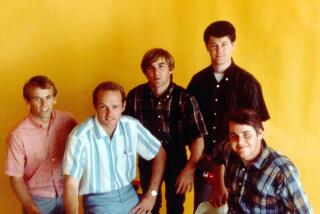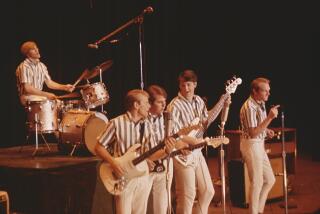Q&A: John Cusack on preparing for role as Brian Wilson in ‘Love & Mercy’
John Cusack is being widely lauded for his portrayal of Beach Boys leader Brian Wilson in the forthcoming biopic “Love & Mercy,” which opens nationally on Friday.
Calendar recently spoke to Cusack, a longtime pop music aficionado, about his experience exploring the harrowing aftermath of Wilson’s nervous breakdown, drug abuse and turbulent adult life, especially the years he spent being treated by psychologist Eugene Landy (played demonically in the film by Paul Giamatti).
Cusack shares the duty of bringing Wilson’s life to the big screen with Paul Dano, who plays Wilson during his creative peak when he immersed himself in recording studios, working on what would become the Beach Boys’ musical masterpiece, the “Pet Sounds” album in 1966 — the year Cusack was born, in Evanston, Ill. Wilson himself plays a hometown show on what will be his 73rd birthday, June 20, at the Greek Theatre.
For starters, talk about your sense of Brian Wilson and what he brought to popular music, and how did you delve into channeling that into your performance?
The sounds we grew up with and that are in our DNA now — it’s easy to take it for granted that they were always there. Great art feels like it always was there. But when you really think about it, nobody had ever done this before. Louis Armstrong used his voice like an instrument, but Brian did it on such an incredible level. For me, I got the [Beach Boys’] “Pet Sounds Sessions” and the “Smile Sessions” box sets and immersed myself in those 24 hours a day to try to get his feeling.
A lot of actors might have focused on Wilson’s personal tics and idiosyncratic behaviors — sometimes awkward smiles and waves, the way he can abruptly change subjects or end conversations when he loses interest. But people close to Wilson are complimenting you for somehow channeling the vulnerability and the sweetness beneath the surface. How did you approach that?
You can’t play someone like Brian by making intellectual choices; it has to be all by feel. I was lucky enough to shoot the film in L.A., and Melinda [Wilson’s wife] and Brian were very open to me working with them. So I spent as much time with them as I could without becoming the guest who wouldn’t leave. I was very thankful for that. Secondarily, the “Smile Sessions” was enormously helpful. It’s an incredible historical document, when you can hear these sounds that shaped pop culture for the next 50 years and listen to them being created on the fly.
Wilson endured a lot of psychological, emotional and physical damage over the years, going back to the abuse he suffered from his father, Murry (played in the film by Bill Camp), from Dr. Landy and the resistance he encountered over new musical directions he wanted to explore. What’s your sense of how he’s weathered all that?
I think it was just terrible, unimaginable abuse and manipulation of this man. But there’s a part of him that’s a tough dude. He’s a survivor. Think about all the people from the ‘60s, think of people who would still be going out today and touring, and be happy, with a family? He’s still going. There’s a sense of the Cheshire cat about him. In his heyday, he was 26 years old and a genius, and that was sort of celebrated. But there’s also this playfulness and mischievousness about him that a lot of people don’t know.
What drew you to the “Love & Mercy” project? Biopics — in particular rock music biopics — often struggle to transcend Hollywood clichés of early success followed by personal and/or professional loss that leads eventually to triumphant redemption.
I was very eager to do it. I’ve always loved that period of pop culture and American history. People who got out to Los Angeles at that time, they knew they had better make it there, because they’d run out of United States. There’s almost like a sense of money in the air under the sprawling Eisenhower suburban image.
Brian is a great messenger of that soul underneath the American Dream. I thought he captured some pure essence about that dream.
Twitter: @RandyLewis2
More to Read
The biggest entertainment stories
Get our big stories about Hollywood, film, television, music, arts, culture and more right in your inbox as soon as they publish.
You may occasionally receive promotional content from the Los Angeles Times.











